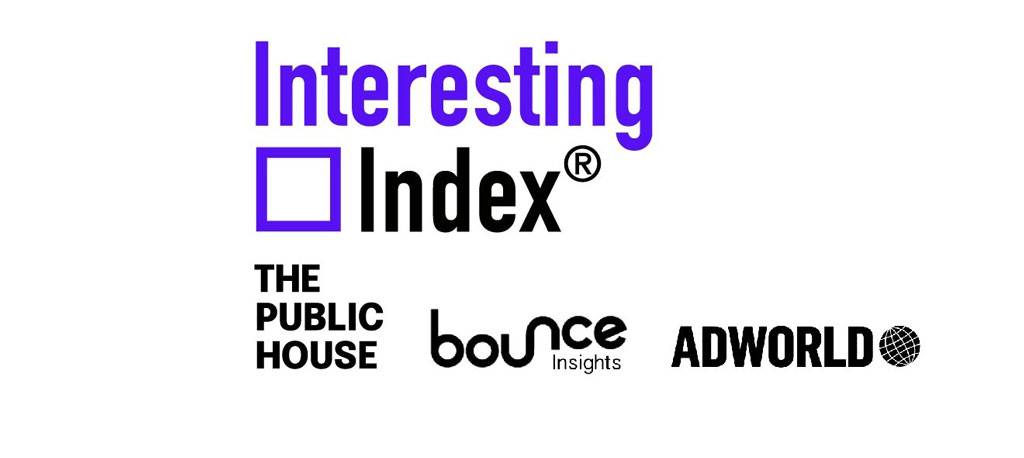 Welcome to the first edition of The Interesting Index, a collaboration between The Public House, Bounce Insights and Adworld.ie. Over the coming months The Interesting Index will set out to understand what ads people remember and why.
Welcome to the first edition of The Interesting Index, a collaboration between The Public House, Bounce Insights and Adworld.ie. Over the coming months The Interesting Index will set out to understand what ads people remember and why.
We’ve all read the research on mental availability and brand building. We all know the power of creativity to unlock business growth… at least we do in theory. For some reason, though, we constantly find ourselves tackling the same age-old challenges: creative agencies struggle to get buy-in for their ideas, and clients battle to convince internal stakeholders that the work will work for their bottom line.
At a time when marketing budgets are being squeezed, the struggle between short-term thinking and big ideas, ‘conservatism’ and ‘creative bravery’ has never been so tough. But aligning bravery with creativity does our industry a disservice when in fact the most dangerous thing brands can do is play it safe and be forgotten.
So, in an effort to debunk the ‘creative bravery’ myth, The Public House, Bounce Insights and Adworld.ie have teamed up to create The Interesting Index which aims to understand what ads people remember and why. This survey will run every two months and will ask people around Ireland which two ads (regardless of format) they recall from the previous two months and ask them to link those ads to an emotion – happy, sad, bored, neutral, angry, surprised etc. By doing this we hope to understand what makes ads memorable and whether memorability is driven more by ‘out-creating’ or ‘out-spending’.
So, let’s get into the results. The top 10 most remembered ads from the past two months, according to The Interesting Index are:
- Guinness (Don’t Jinx It)
- Vodafone (Connections You Can Always Rely On – Rugby World Cup)
- Aldi (Kevin’s Root to Paris)
- Tesco (Clubcard)
- Rockshore (Refreshingly Irish)
- Lidl (Go Full Lidl)
- Sky (TV and Broadband)
- Cadbury (Become A Supporter & A Half)
- McDonalds (Monopoly)
- Dunnes Stores (Shrink Your Bill)
Our inaugural report demonstrated the importance of topicality and relevance, as many of the ads people remembered were related to the Rugby World Cup – with Guinness emerging as the most remembered ad from the past two months, followed by Vodafone and Aldi. Among all three, rugby was mentioned as the main aspect that caught people’s attention. The power of celebrity endorsers was also evident, with Paul O’Connell and Brian O’Driscoll being mentioned by many for Aldi and Guinness respectively.
“Guinness ad – don’t jinx it. Very funny ad about not jinxing the Irish team in the rugby World Cup. Interviewing Irish rugby fans who thought we’d win the 2019 cup and said it.”
“Guinness ad about not saying that Ireland would win the rugby World Cup. Remembered it because it was funny.”
Other creative devices like music and humour were also proven to be effective techniques for driving memorability and recall, with Rockshore’s ‘Refreshingly Irish’ campaign standing out to many for these reasons. This is especially interesting in light of Orlando Wood’s research from his publication ‘Look Out’ which showed that humour in advertising is “declining at an alarming rate”.
“It is for Rockshore and it’s about people slagging their mates about their new teeth, clothes style and wallet from 30 years ago. It is very Irish humour and how we slag each other off and have craic in the pub.”
“Rockshore – with the rewording of the backstreet boys as long as you love me and playing on the banter type slaggings that only mates etc away with.”
Notably, almost all ads recalled were brand-led campaigns which focused on storytelling – reinforcing the countless research that shows how effective this approach is for brand growth. At the same time, the impact of marketing investment cannot be underestimated, with many of the top performers coming from industries with typically high media spend – for example, four of the major retailers (Aldi, Tesco, Lidl and Dunnes) made it into the top 10.
Across the board, ‘Interested’ and ‘Happy’ were the two most common emotions connected to the ads respondents remembered, suggesting something grabbed their attention and left them with a positive impression. However, this doesn’t mean that negative emotions don’t play a useful role in driving recall and interest too.
Vodafone’s ad which tells the story of a father/daughter relationship after the parents’ separation was remembered by some because it made them feel sad. Similarly, anger was a key reason for recall of charity ads and public service campaigns such as the RSA’s work. In fact, the descriptions of the ads connected with more negative emotions were often the most descriptive and remembered in detail.
“RSA TV ads about drink driving and its devastating effects. I remembered the ad because the personal stories of the people in the ad were very sad and were good at getting people’s attention.”
Encouragingly, only 7% of people used ‘bored’ to describe how they felt about any of the ads they mentioned – clearly demonstrating that in order to be remembered, brands cannot be dull.
Finally, we asked respondents for their overall opinion on advertising in the past two months on a scale of ‘Brilliant advertising with fresh ideas’ to ‘Terrible advertising with boring ideas’. The average rating according to 41% of respondents, was ‘OK advertising, nothing great or bad’. Our hope is that the public’s perception of Irish advertising continues to improve over the next few bursts of The Interesting Index.

Commenting on the launch of The Interesting Index, Rob Kiely from Bounce Insights said “At Bounce Insights, we are delighted to collaborate with our partners at The Public House. Together, we aim to discover impactful insights that assist brands in connecting with their audiences in creative new ways that cut through the noise. Gaining a deep understanding of the consumer is invaluable for brands seeking to build lasting bonds. By tapping into motivations and addressing unmet needs, you open up boundless opportunities for long-term loyalty and growth. We eagerly anticipate continuing this exciting partnership with The Public House and Adworld.ie , to keep uncovering more enlightening perspectives on advertising and what is genuinely resonating with today’s customers.”




















